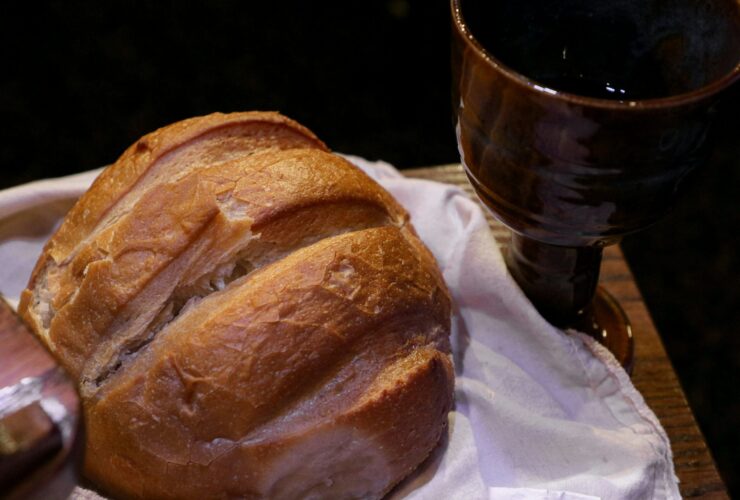Throughout the Bible there are many references to different types of fruit trees. Nearly synonymous with the Middle East, even today, is the olive tree which is mentioned in the Bible as one of the main products of Israel (Deut. 8:8). In the ancient world, olives were grown for the oil that could be pressed from them rather than for the fruit in its raw state. These ever-green trees bloom in the early summer with hundreds of small white flowers of which a low percentage become fruit. At harvest time olive trees would be beaten with sticks to dislodge the olives, that would be collected and carried off to be pressed for their oil. Olive oil was used for many applications: it was a staple of food preparation, used medicinally to treat wounds, used practically as fuel for lamps, and used religiously for offerings, anointing, and to light the Tabernacle and Temple.
Biblically olive trees are used symbolically to represent blessing and on the flipside their destruction is envisioned as God’s judgment (Deut.28:40; Amos 4:9; Hag. 2:19; Mic. 6:15). They are also used as a symbol of beauty (Psalm 52:10), and famously the prophets likely have olive trees in mind when they spoke of the Messiah as a shoot from the stump of Jesse (Isa. 11:1). Olive trees were propagated not by seeds but by their natural growth pattern of sending out shoots from the base of the trunk which could be cut off and rooted into a whole new tree. Even after felling an olive tree leaving only the stump, the tree would send out these shoots from the base, which in Israel became a symbol of children rising and growing on after the death of their fathers. Psalm 128:3 says, “Your wife will be like a fruitful vine within your house; your children will be like olive shoots around your table.”
“For the Lord your God is bringing you into a good land… a land of wheat and barley, of vines and fig trees and pomegranates, a land of olive trees and honey…”
Deuteronomy 8:7-9
Pomegranates were also cultivated in ancient Israel (Deut. 8:8), and the interior seeds of the fruit were eaten fresh, dried for longer storage, pressed for juice, wine and syrup production, and the fruit rinds may have been used medicinally. Symbolically, pomegranates were used to represent fertility or fruitfulness and they adorned priestly clothing (Ex. 28), the décor of the Temple (1 Kings 7) and were a popular design in everyday life.
Figs were another important fruit grown in ancient Israel (Deut. 8:8). They were a key element of the economy (2 Kgs 18:31; Isa. 36:16) in part due to their two harvests, the winter harvest which was eaten fresh, and the summer harvest that was dried either individually or in cakes for food storage. For Israel fig trees also symbolised the blessings of their covenant with God, and the destruction of the fig tree is envisioned as God’s judgment (Isa. 43:4; Jer. 8:13; Joel 1:7).
The sycamore trees of the Bible are also a type of fig tree (Ficus sycomorus L.), and these give six or more yields of fruit each year. Their figs were considered common food or food for the poor, and it’s believed that in some instances, they may have been grown specifically for their wood (Isa. 9:9; 1 Chr. 27:28).
Dates which grow on many varieties of date palm trees were grown in locations throughout Israel and require extra care to ensure pollination of the flowers (male flowers had to be purposely hung beside female clone flowers – a practice also done in Egypt and Babylon). The products of date palms are the dates of course, as well as date honey, its leaves are used in the making of baskets and woven products, its fibres are used in making cloth and rope, and its sap can also be extracted as a fresh or fermented drink.
There are at least two fruit trees in the Bible that have not been positively identified, one (tappuah) that is described as golden (Prov. 25:11) and so may be quince, or apricot. And another (Baka) may be the black mulberry (2 Sam. 5:23-24, Ps. 84:7).

Corie Bobechko is a daily co-host, speaker, and writer of Bible Discovery. She also hosts a YouTube channel that shows how history and archaeology prove the Bible. Her heart for seekers and skeptics has led her to seek truth and share it with others. Corie also has a Bachelor of Theology from Canada Christian College.






